#migrationpolicy
Explore tagged Tumblr posts
Text
🚨 Hungary’s Bold Move: MIGRANTS to be Bused to BRUSSELS! 🚌
In our latest video, we explore Hungary’s strong stance against the EU's migration policies. With over 1 million illegal border crossing attempts stopped, Hungary is feeling the pressure. Now, the government has a bold plan: busing intercepted migrants directly to Brussels! 🇭🇺
Watch the full video to learn more about this controversial move and share your thoughts! 👇 📺 Watch here: https://youtu.be/C2s7RxotHuI
youtube
2 notes
·
View notes
Text
Working with an Immigration Consultant
Immigrating to a new country is an exciting yet complex process. Many people choose to work with an immigration consultant to navigate the legal and procedural challenges. However, not all experiences with consultants are smooth, and mistakes can lead to unnecessary delays, financial losses, or even visa denials. To help you make the most of your immigration journey, here are some common mistakes to avoid when working with an immigration consultant.
1. Not Researching the Consultant’s Credentials
One of the biggest mistakes people make is failing to verify the credentials of their immigration consultant. Ensure that the consultant is registered with the appropriate regulatory body in your country, such as the ICCRC (Immigration Consultants of Canada Regulatory Council) for Canada or MARA (Migration Agents Registration Authority) for Australia. Checking Migration Company Reviews online can also help you gauge their reputation and past client experiences.
2. Ignoring Red Flags of Fraud
Unfortunately, some individuals pose as immigration consultants without proper authorization. Be cautious of red flags such as guarantees of success, requests for cash-only payments, or unwillingness to provide a written contract. A legitimate consultant will always be transparent about fees, processing times, and potential risks.
3. Not Understanding the Fees and Services Provided
Before signing a contract, make sure you fully understand the fees involved and the services included. Some consultants charge additional fees for services you may assume are included. Comparing different Migration Company Reviews can help you understand fair pricing and avoid overpaying.
4. Failing to Provide Accurate and Complete Information
Providing incorrect or incomplete information to your consultant can lead to complications in your application. Ensure that all personal details, documentation, and financial statements are accurate and up to date. Any discrepancies could result in delays or even rejection.
5. Relying Entirely on the Consultant
While a consultant can guide you through the immigration process, you should still educate yourself about the requirements and procedures. Stay involved in your case by asking questions and following up regularly. Relying entirely on a consultant without understanding your application can leave you vulnerable to mistakes or miscommunication.
6. Not Reading the Contract Carefully
Always read the terms and conditions of the contract carefully before signing. Ensure that it outlines the services provided, total fees, refund policies, and timelines. If any part of the contract is unclear, ask for clarification before proceeding.
7. Overlooking Client Reviews and Testimonials
Online reviews and testimonials from past clients can provide valuable insights into an immigration consultant’s credibility. Searching for Migration Company Reviews on trusted platforms can help you identify consultants with a history of successful applications and ethical practices.
8. Missing Deadlines Due to Poor Communication
Immigration applications involve strict deadlines, and poor communication with your consultant can cause you to miss important submissions. Choose a consultant who responds promptly and keeps you updated on your case’s progress.
Conclusion
Working with an immigration consultant can make the migration process smoother, but only if you take the necessary precautions. By researching credentials, avoiding fraudulent consultants, understanding fees, and staying engaged in your application, you can avoid common pitfalls. Checking Migration Company Reviews can further help you choose a reputable consultant, ensuring a more successful immigration experience.
1 note
·
View note
Text
Debate between Chancellor Olaf Scholz of the SPD and opposition leader Friedrich Merz of the CDU (German General elections on February 23, 2025)
"The dialogue reflects an ongoing negotiation between political agendas and constitutional constraints. Both candidates interpret constitutional stipulations in line with their political ideologies, with Scholz advocating for a more progressive interpretation, especially concerning social welfare and the debt brake, while Merz focuses on economic stability and traditional interpretations."
youtube
The debate between Chancellor Olaf Scholz of the SPD and opposition leader Friedrich Merz of the CDU presents several key insights into the current political climate in Germany as they approach the general elections on February 23, 2025.
Migration and Asylum Policy:
Scholz emphasized measures taken during his term to reduce irregular migration, highlighting border controls and deportations. He defended his administration's approach to the Common European Asylum System (CEAS) and criticized Merz for breaking a taboo by engaging with the AfD on a parliamentary motion.
Merz attacked the government's handling of migration, particularly focusing on the increase in irregular migrant numbers under Scholz's tenure. He suggested tougher policies and criticized the coalition for not being able to agree on effective measures due to internal disagreements, particularly with the Greens.
Economic Policy and Deindustrialization:
Scholz defended his economic record by citing high employment rates and steps taken to combat inflation and bureaucracy. He proposed a "Made in Germany" bonus to stimulate investment, which Merz dismissed as a temporary measure.
Merz portrayed a dire economic situation, claiming Germany was undergoing deindustrialization, evidenced by high unemployment and business insolvencies. He advocated for permanent tax reductions and less bureaucracy to spur growth.
Defense and NATO Commitment:
Both leaders agreed on the need to meet NATO's 2% GDP defense spending target, but differed on funding sources.
Scholz suggested that without reforming the debt break, meeting defense spending would require either cutting other budgets or increasing taxes, especially for high earners.
Merz focused on economic growth to fund defense without necessarily increasing debt or taxes, though he seemed open to discussing debt break reforms.
Cooperation with AfD:
The debate highlighted a significant point of contention with Merz's CDU having previously cooperated with the AfD on a non-legislative motion, which Scholz criticized as a taboo break, potentially affecting voter perceptions and coalition discussions post-election.
Foreign Policy, Particularly Regarding Ukraine and US Relations:
Both candidates addressed the implications of Donald Trump's presidency on European, especially German, foreign policy. They expressed concerns about Trump's unpredictability but stressed the need for a united European front and continued support for Ukraine.
Electoral Strategy and Coalition Building:
Scholz seemed confident in securing another term, promising stability and criticizing the CDU's potential alliances with the AfD.
Merz positioned his party as potentially needing only one coalition partner, possibly the FDP, but was less clear on how he would manage the political landscape if the FDP did not pass the electoral threshold.
Public Perception and Voter Concerns:
The debate touched on public fears about economic stability, immigration, and the rise of right-wing populism, with both leaders attempting to address these issues directly or indirectly through their policy discussions.
Overall, the debate showcased a sharp contrast in policy approaches, with Scholz defending his government's record and Merz attacking it while proposing his own solutions. The discussion on potential coalition partners and the handling of the AfD issue could significantly influence voter decisions in the upcoming election.
Effects on European Stakeholders
Economic Influence:
Germany's Economic Policy: The outcome of the election could shape Germany's economic policies, particularly concerning fiscal discipline, investment in green technology, and support for industries like automotive and manufacturing. A CDU-led government might lean towards more business-friendly policies with less emphasis on stringent climate regulations, whereas an SPD continuation could mean sustained or increased focus on environmental policies.
EU Fiscal Rules: Germany's stance on EU fiscal rules, especially the debt brake, will influence European discussions on fiscal policy. A CDU win might advocate for maintaining or even tightening these rules, potentially limiting fiscal expansion in other EU countries. Conversely, Scholz's SPD might push for reforms, allowing for more flexible fiscal policies to address issues like defense spending or infrastructure.
Migration and Asylum Policy:
EU Migration Framework: Germany's approach to migration could either strengthen or challenge the EU's migration policies. A more conservative approach from the CDU/CSU might push for tougher border controls and asylum policies, potentially influencing the broader European strategy. An SPD-led government might continue advocating for a more humane and coordinated European response, aligning with countries like France and Italy for reform.
Foreign Policy and Security:
Ukraine and NATO: Germany's commitment to supporting Ukraine and its stance on NATO will be crucial. A CDU-led government might be more hawkish, potentially pushing for stronger military support and a more decisive stance against Russia. The SPD has historically been more cautious, though recent years have seen a shift towards stronger support for Ukraine.
Transatlantic Relations: With Donald Trump in office, Germany's relationship with the U.S. could be pivotal. A government under Merz might be more aligned with Trump's policies, especially on defense spending, while Scholz has expressed concerns about Trump's unpredictability, potentially leading to a more balanced, cautious European approach.
Climate and Energy Policy:
EU Green Deal: Germany's role in the European Green Deal is significant. A CDU government with a focus on reviving nuclear energy or delaying combustion engine bans could face opposition from countries heavily invested in renewables. SPD's continuity might maintain momentum towards aggressive climate targets but could also face challenges in coalition negotiations, particularly with parties like the Greens or FDP.
Political Stability and Populism:
Rise of Populism: The election's outcome will influence the political landscape regarding the rise of right-wing populism across Europe. If the AfD gains significant ground or influence, it could embolden similar movements in other countries, affecting European political debates on sovereignty, immigration, and EU integration.
Coalition Dynamics: The type of coalition formed in Germany could set examples or precedents for coalition governments elsewhere in the EU, especially in nations where multiple parties are necessary for governance.
Institutional Influence:
EU Leadership: Germany's position in the EU is central in shaping policies and leadership roles. The election results will impact Germany's influence in selecting or supporting candidates for key EU positions like the European Commission President or ECB leadership.
In conclusion, the 2025 German election will not only define Germany's domestic policy but will also send ripples across the European Union, potentially affecting economic policies, security arrangements, migration strategies, climate actions, and the broader political environment. Stakeholders in Europe will watch closely, as Germany's policies can significantly sway EU-wide decisions and orientations.
Ukraine
Peace Prospects with Trump in Power:
Olaf Scholz (SPD): Expressed cautious optimism about achieving peace faster with Trump in office, emphasizing the need to signal continued support for Ukraine to discourage further Russian aggression. Scholz highlighted the tragic human cost of the war and the necessity for U.S. involvement in peace negotiations.
Friedrich Merz (CDU): Suggested that peace might have been achieved earlier with more determined support for Ukraine from the outset. He stressed that while Trump's involvement could be pivotal, any peace plan must include Ukrainian participation and not be decided over their heads.
Defense and NATO Membership:
Scholz: Argued that NATO membership for Ukraine isn't immediately feasible due to the ongoing conflict. Instead, he focused on providing security guarantees to protect Ukraine from future Russian attacks, emphasizing Germany's role as a strong supporter in Europe.
Merz: Doubted immediate NATO membership for Ukraine due to its involvement in war but supported the idea in principle for the future. He advocated for a stronger European strategy, including increasing NATO presence in areas like Greenland, to address broader security concerns.
Missile Supply and Escalation Risks:
Scholz: Was cautious about supplying cruise missiles to Ukraine, focusing on preventing the war from escalating into a NATO-Russia conflict. He criticized Merz for what he perceived as inconsistent positions on military aid.
Merz: Maintained that any military supply, including missiles, should be a coordinated decision across Europe, dismissing claims of inconsistency in his stance.
Economic and Financial Implications:
Both candidates discussed the financial commitments required for defense, with Scholz advocating for debt break reform to fund defense spending increases, while Merz proposed growth and budget restructuring as alternatives to increasing debt or taxes.
Analysis:
Debate Dynamics: The discussion on Ukraine showcased a mix of strategic, humanitarian, and economic concerns. Both leaders acknowledged the complexity of the situation, with Scholz being more reserved about escalating military involvement, while Merz seemed to push for a more assertive European stance.
Political Strategy: The conversation reflected broader political strategies for dealing with international conflicts, with Scholz aligning his policy with a broader European consensus and Merz advocating for European unity in response to unpredictable U.S. policies under Trump.
Future Implications: The debate indicated potential shifts in policy depending on the election outcome. Scholz's approach might lead to a more cautious, diplomacy-focused strategy, whereas Merz might push for a more robust military and strategic European response.
The debate underscored the importance of transatlantic relations, the balance between military support and diplomacy, and the significant influence of U.S. policy on European security dynamics.
Trump
Impact on Ukraine Peace:
Olaf Scholz suggests that with Donald Trump in power, it remains to be seen if peace in Ukraine could be achieved faster. He emphasizes the need for continued support to Ukraine to deter Russian aggression and expresses hope from conversations with Trump that peace might be possible.
Friedrich Merz is less optimistic about an immediate resolution but stresses the importance of a coordinated strategy between Europe and America to protect Ukraine. He acknowledges the unpredictability of Trump's policies but stresses the necessity of European unity.
Trump's Predictability:
Merz describes Trump as "predictably unpredictable," indicating that while Trump's actions and statements can be anticipated to some extent, there's still a level of unpredictability. He underscores the need for a cohesive European strategy in dealing with Trump's administration.
Foreign Policy and NATO:
Scholz mentions the importance of maintaining a strong transatlantic relationship, acknowledging the significant role the U.S. played in post-war democracy. He discusses the need for clear statements and actions to prevent any aggressive moves, like those concerning Greenland, and supports increasing NATO presence in strategic areas.
Merz agrees on the need for collective action within NATO, particularly in response to potential threats like those to Greenland, emphasizing that Europe should not underestimate its own power and should act unitedly.
Economic Implications (Tariffs):
Both leaders discuss the potential economic ramifications of Trump's tariff policies. Scholz mentions preparedness for retaliatory measures within the EU framework, highlighting the need for solidarity. Merz reflects on past tariff conflicts and the diplomatic solutions reached, suggesting a similar approach might be necessary if new tariffs are imposed.
General Concern Over U.S. Policy Shifts:
There's a general concern expressed about Trump's policy shifts, particularly regarding climate agreements, aid, and international relations. Both leaders express a need for readiness to adapt to these changes while maintaining strong diplomatic ties.
The discussion highlights the complexities of international relations under Trump's influence, focusing on economic, security, and diplomatic dimensions. This topic is crucial as it directly impacts Germany's foreign policy, security strategy, and economic stability.
Musk
Mention of X (formerly Twitter):
Both candidates, Olaf Scholz and Friedrich Merz, briefly touch upon their presence on X, indicating they will continue to use the platform despite having mixed feelings about it. Scholz humorously notes he doesn't feel good there, suggesting a critical view of the platform's environment or direction under Musk's leadership. Merz concurs, indicating he does interviews with newspapers that are not favorable to him, implying a broader approach to media engagement beyond social platforms like X.
Context of Discussion:
The mention of X comes up in a segment where they discuss various policies and personal stances, including on social issues like gender and international relations. It's not deeply discussed but serves as an aside to highlight their media strategies.
Implications:
This brief acknowledgment might reflect their awareness of X's significant role in public discourse but also a cautious approach to how they engage with it, considering Musk's controversial leadership and changes to the platform's policies and culture.
Analysis:
Political Strategy: Both leaders recognize the importance of maintaining a presence on influential platforms like X for political communication, even if they express reservations. This could be seen as an effort to connect with younger or tech-savvy voters while maintaining traditional media ties.
Public Perception: Their comments might resonate with voters who are critical of social media's role in politics or those concerned about the direction platforms like X are taking under new management. It subtly acknowledges the polarized reception Musk's changes have received.
Cultural and Media Influence: The mention of X in this context also underscores the shift in how political leaders must navigate new media landscapes, where platforms like X can significantly influence public opinion, often more directly than traditional media.
In summary, while Elon Musk and X are not central topics in this debate, their brief mention illustrates the broader implications of social media in politics, showing how leaders must adapt to and sometimes critique the platforms they use to engage with the public.
Candidates' Ethics
Chancellor Olaf Scholz (SPD):
Respect and Tone: Scholz maintained a generally composed demeanor but was not immune to personal attacks. He referred to Friedrich Merz as "Fritze Merz," which could be seen as a form of political jest but might also indicate a lack of respect if not taken in stride. His comments on Merz's trustworthiness and policy integrity suggest a critical stance, potentially lacking in fostering political respect.
Policy Integrity: Scholz defended his policies robustly, especially on migration, economic strategies, and defense spending. His argument for a statutory minimum wage increase and his critique of Merz's stance on working with the AfD (Alternative for Germany) paint him as someone committed to social democratic values. However, his approach to the debt brake and fiscal policy might be seen as less transparent or overly optimistic about economic growth to fund defense without clear tax increases or debt restructuring.
Cooperation with Extremists: Scholz was clear in his rejection of cooperation with the AfD, emphasizing the need to keep right-wing populists out of government due to Germany's historical context. This stance reflects a strong ethical commitment to democratic principles.
Foreign Policy: His approach to dealing with Donald Trump and international relations showed a readiness to maintain diplomatic relations while standing firm on key issues like tariffs and support for Ukraine.
Friedrich Merz (CDU):
Respect and Tone: Merz responded to Scholz's personal jabs with a claim of taking them in stride, suggesting a level of political resilience. However, his retort about Scholz being a "lightweight" indicates a tit-for-tat approach which might not contribute positively to political discourse.
Policy Integrity: Merz criticized Scholz's economic policies and governance, focusing on the increase in AfD support under Scholz's tenure, implying a failure in managing political polarization. His stance on reducing corporate taxes and managing the economy through growth rather than debt was presented as a more conservative fiscal approach, but it lacked clarity on how to achieve significant defense spending increases without impacting social services or debt levels.
Cooperation with Extremists: Merz's alleged "taboo break" in working with the AfD, even if only in a procedural context, was a focal point of critique. This moment raised ethical concerns about his commitment to traditional democratic norms and alliances, although he repeatedly clarified his opposition to formal cooperation with the AfD on substantive policy issues.
Foreign Policy: Merz's views on international relations seemed more skeptical of immediate peace prospects in Ukraine under Trump's influence, showing a cautious approach to international alliances and commitments. His comments on NATO and EU membership for Ukraine suggest a strategic but cautious approach to global politics.
Ethical Considerations:
Respect for Political Opponents: Both leaders engaged in personal critiques, which might undermine public trust in political discourse. The tone could have been more constructive, focusing on policy differences rather than personal attributes.
Transparency and Accountability: Both candidates were somewhat evasive on how they would fund ambitious plans (like increased defense spending) without either increasing debt or cutting social services, which raises questions about the transparency of their fiscal policies.
Commitment to Democratic Principles: Scholz's firm stance against working with the AfD contrasts with Merz's criticized move, highlighting differences in commitment to democratic norms and the fight against political extremism.
Public Engagement and Trust: The debate highlighted a significant public concern over political stability and trust in government due to the rise of extremist parties. Both leaders need to address this concern more directly to restore or maintain public confidence.
In conclusion, while both leaders presented their case with vigor, the debate underscored the need for clearer, more ethical approaches to policy-making, coalition building, and international relations, particularly in a politically polarized environment.
German Constitution
Migration and Asylum Policy:
Both candidates discuss the management of asylum seekers and irregular migration, with particular focus on Germany's legal obligations under national and European law. The debate includes references to constitutional amendments (e.g., from 1993) regarding asylum rights and the handling of border rejections. The German Constitution (Grundgesetz) explicitly outlines rights and procedures for asylum seekers , which has been a contentious point in political discourse, especially regarding the balance between humanitarian obligations and security concerns.
Cooperation with the AfD (Alternative for Germany):
A significant part of the debate centers around the taboo of working with the AfD, a right-wing populist party. This discussion touches on the constitutional framework that underpins Germany's political culture, notably the Basic Law's commitment to democratic principles and the protection against extremism. The debate highlights the tension between political strategy and constitutional values, especially in light of the Basic Law, which outlines the democratic principles political parties must adhere to.
Economic Policy and the Debt Brake (Schuldenbremse):
The discussion on economic policy, including tax reforms and budget management, directly relates to the German Constitution, which introduced the debt brake. This amendment limits structural deficits to ensure fiscal responsibility. The debate includes differing views on how to finance public spending (like defense) without violating this constitutional rule, suggesting reforms or reinterpretations of the debt brake.
Energy Policy and Nuclear Power:
The debate over nuclear energy touches on Germany's constitutional commitment to environmental protection, which mandates state protection of the natural foundations of life and animals. The phase-out of nuclear power, a policy decision, reflects this constitutional mandate but also involves economic and strategic considerations debated by the candidates.
Foreign Policy and Security:
Discussions on Ukraine, NATO, and U.S. relations involve Germany's constitutional framework for foreign and security policy, which allows for international cooperation, including in NATO. The candidates' positions on supporting Ukraine or dealing with U.S. policy under President Trump illustrate how these constitutional provisions interact with current geopolitical realities.
Evaluation:
Constitutional Adherence: The dialogue reflects an ongoing negotiation between political agendas and constitutional constraints. Both candidates interpret constitutional stipulations in line with their political ideologies, with Scholz advocating for a more progressive interpretation, especially concerning social welfare and the debt brake, while Merz focuses on economic stability and traditional interpretations.
Political Strategy vs. Legal Framework: The debate underscores the challenge of aligning campaign promises with the legal and constitutional limits of German governance. This is particularly evident in discussions about coalition possibilities with parties like the AfD, where constitutional principles of democracy and human dignity come into play.
Public Perception and Constitutional Values: The candidates' approaches to issues like migration and economic policy are framed not just by party strategy but also by how they align with or challenge the public's understanding of constitutional rights and obligations.
In conclusion, this debate illustrates the complexity of German politics where constitutional principles are not just legal frameworks but are deeply intertwined with political strategy and public expectation.
Universal Declaration of Human Rights
The debate touches on several themes relevant to the Universal Declaration of Human Rights (UDHR).
Equality and Dignity:
Migration Policy: Both leaders discuss immigration and asylum policies, which relate to the dignity and equality of migrants. Scholz emphasizes border control and deportation measures, while Merz criticizes the handling of migration, suggesting it impacts local communities negatively. The debate touches on how to balance security with the right to seek asylum, potentially affecting the dignity of asylum seekers if policies are too restrictive.
Right to Life, Liberty, and Security of Person:
Security and Defense: The discussion on defense spending and NATO membership for Ukraine reflects on providing security, a core right under this article. Both leaders advocate for increased defense spending, which indirectly supports the security of individuals both domestically and internationally.
Freedom of Movement:
Migration and Border Policies: The debate on asylum and migration touches upon freedom of movement, particularly the right to seek and enjoy asylum. Scholz's mention of border controls and Merz's critique of current migration management could be seen as potentially restrictive to these freedoms if not managed humanely.
Right to Participate in Government:
Political Participation: The entire debate setting is a manifestation of this right, where citizens can observe policy discussions and make informed voting decisions. Both leaders aim to sway public opinion, ensuring that the public can engage in the democratic process.
Right to Work and to Protection Against Unemployment:
Economic Policies: Discussions on unemployment, economic growth, and industrial policy directly relate to the right to work and protection against unemployment. Scholz focuses on job creation through infrastructure and social support, while Merz emphasizes reducing bureaucracy and supporting businesses to boost employment.
Right to a Standard of Living:
Welfare and Economic Measures: The debate on the minimum wage, tax policies, and social security benefits directly impacts the standard of living. Scholz advocates for increasing the minimum wage and reducing social contributions to protect lower-income earners, while Merz focuses on economic growth to fund social welfare.
Social and International Order:
International Relations: The discussion on foreign policy, especially concerning Ukraine, reflects Germany's role in maintaining peace and international order. The leaders' stances on supporting Ukraine and dealing with international figures like Donald Trump show how domestic policy informs international responsibility.
Conclusion: This debate highlights the complexities of upholding human rights in policy-making. While both leaders aim to address security, economic stability, and migration, their approaches reflect different interpretations of how best to balance rights with practical governance. The dialogue underscores the importance of policies that respect human rights while addressing national concerns, aligning with the UDHR's principles of dignity, freedom, and justice for all.
Culture of Enlightenment
Rational Debate and Discourse:
Positive: The debate format itself upholds enlightenment values by providing a platform for rational discussion, where each leader presents their views, policies, and critiques of the other's approach. This mirrors the enlightenment ideal of using reason to debate and solve societal issues.
Negative: At times, the debate veers into personal attacks (e.g., Scholz calling Merz "Fritze Merz," Merz labeling Scholz as a "lightweight"), which could be seen as straying from the enlightenment principle of focusing on the substance of arguments rather than personal attributes.
Freedom of Speech and Expression:
Positive: The open discussion of political stances, including controversial topics like migration, economic policy, and international relations, reflects the enlightenment's advocacy for free speech as a means to explore and critique governance and societal norms.
Negative: The personal jabs might suggest that not all speech was directed towards constructive enlightenment but rather towards political point-scoring.
Separation of Powers and Accountability:
Positive: There is an evident accountability mechanism as both leaders are questioned on their policies and past decisions, embodying the enlightenment idea that leaders should be answerable to the public and to each other in a democratic framework.
Negative: The debate sometimes lacks depth in exploring how each policy would genuinely balance power or ensure checks and balances, which are central to enlightenment governance concepts.
Social Contract and Public Welfare:
Positive: The discussion around economic policies, migration, and social welfare touches on the enlightenment concept of the social contract, where the government's role in ensuring citizens' welfare is debated, particularly in relation to taxes, minimum wage, and social security.
Negative: There's a noticeable divide, with less consensus on how to address these issues, which might reflect poorly on the enlightenment ideal of rational agreement for the collective good.
Skepticism and Critique:
Positive: The debate includes questioning of policies, past actions, and future promises, which aligns with enlightenment skepticism where nothing should be accepted without scrutiny or evidence.
Negative: Some arguments seem more politically motivated than based on a genuine critique, potentially undermining the enlightenment value of objective analysis.
Education and Information:
Positive: The debate serves as an educational tool, informing the public about each party's stance on critical issues, which is an enlightenment principle of educating the populace for better governance.
Negative: The complexity of some topics might not fully be elucidated due to time constraints or the nature of debate, potentially leaving voters less informed than intended.
Conclusion: This debate largely respects enlightenment values by promoting public discourse, accountability, and the exploration of policy through debate. However, it also shows the challenges of maintaining enlightenment ideals in the heat of political rivalry, where personal attacks and strategic positioning sometimes overshadow substantive policy discussion. The enlightenment would advocate for a more focused, less adversarial approach to discussing public policy, aiming for solutions that genuinely advance societal welfare through reason and mutual respect.
Fallacies
Ad Hominem:
Example: Both candidates engaged in personal attacks rather than focusing solely on policy issues. For instance, Scholz calling Merz "Fritze Merz" and Merz calling Scholz a "lightweight." These insults aim to undermine the credibility of the opponent without addressing the substance of their arguments.
Fallacy: Instead of addressing the policy or the argument directly, they attack the character of the person presenting the argument, which is a clear ad hominem fallacy.
Straw Man:
Example: Merz suggests that Scholz's policy on migration would lead to uncontrolled influx, which seems to exaggerate or misrepresent Scholz's actual policy stance.
Fallacy: This involves misrepresenting an opponent's argument to make it easier to attack or refute.
False Dichotomy:
Example: When discussing economic policies, there's an implication by both sides that only one side's approach (either tax increases or debt) can solve the financial issues, ignoring possibly viable combinations or alternative solutions.
Fallacy: This fallacy presents only two options when in reality, there might be more than one way to address the issue at hand.
Appeal to Fear:
Example: Merz's mention of the rise of the AfD under Scholz's tenure implicitly suggests that voting for Scholz would lead to further growth of far-right politics, potentially scaring voters into supporting CDU instead.
Fallacy: This is an appeal to fear, where an argument is made by increasing fear or prejudice rather than by using reason.
Cherry Picking:
Example: Scholz cherry-picks statistics on employment and inflation to paint a rosier picture of his government's performance, whereas Merz focuses on unemployment and bankruptcy to argue against this view.
Fallacy: Selective use of facts or data to support one's argument while ignoring other data that might contradict it.
Post Hoc, Ergo Propter Hoc (False Cause):
Example: The discussion on migration where both leaders try to link policies directly to the rise or fall of migrant numbers without considering external factors like global economic conditions or EU policies.
Fallacy: Assuming that because one event follows another, the first must have caused the second.
Appeal to Emotion:
Example: The debate over defense spending where both leaders appeal to national pride and security concerns to justify their economic and policy positions.
Fallacy: Using emotional responses rather than logical arguments to persuade the audience.
Hasty Generalization:
Example: Merz generalizes that Scholz's policies are entirely left-leaning and would not gain majority support, based on current political trends rather than a broad analysis of voter preferences.
Fallacy: Making a broad assumption based on limited evidence or a small sample.
Tu Quoque (You Too):
Example: When Scholz challenges Merz on his consistency regarding support for Ukraine, implying that Merz's criticisms are hypocritical given past statements or actions.
Fallacy: Deflecting criticism by pointing out faults in the critic rather than addressing the criticism itself.
This analysis highlights how debate can often involve rhetorical strategies that might appeal to voters emotionally but can detract from substantive policy discussion. Recognizing these fallacies is crucial for informed voting and understanding political discourse.
Debate Quality
Content and Substance:
Depth of Discussion: The debate covered an extensive range of topics including migration, economic policy, defense spending, and international relations, demonstrating a comprehensive engagement with current political issues in Germany. Both candidates, Chancellor Olaf Scholz (SPD) and Friedrich Merz (CDU), presented their views and policies, although the discussion sometimes veered into personal attacks rather than substantive policy debate.
Policy Clarity: Each candidate managed to articulate their positions clearly, especially on critical issues like migration, economic recovery, and security. However, the debate often lacked detailed explanations of how policies would be implemented, with broad statements on intentions rather than concrete steps.
Relevance to Voters: The topics discussed were highly relevant, touching on voter concerns like economic stability, immigration, and national security. However, the personal jabs might have distracted from the substantive issues at hand, potentially frustrating voters looking for solutions rather than conflict.
Format and Structure:
Time Management: The debate was structured to ensure equal speaking time, which was a positive aspect. However, the moderator occasionally had to interrupt to keep the discussion on track, suggesting a need for tighter control over the flow of conversation.
Moderator's Role: The moderator did well in trying to steer the conversation back to substantive topics and manage the time, but the debate could have benefited from more assertive moderation to prevent personal attacks and ensure a focus on policy details.
Audience Engagement: There was no mention of live audience interaction or questions, which might have enriched the debate by bringing in direct public input. This could have made the discussion more dynamic and grounded in real voter concerns.
Style and Presentation:
Rhetoric and Tone: The tone was occasionally combative, with both leaders using strong language to criticize each other's past decisions or policies. Scholz often defended his government's actions, while Merz attacked on issues like economic management and security policy.
Personal vs. Professional: While personal barbs were exchanged, both leaders attempted to project competence and reliability in their policy discussions. However, the personal nature of some attacks might have overshadowed their professional demeanor.
Public Perception: The debate might have left viewers with mixed feelings; those looking for a clear policy direction could find value, while others might see it as more of a personality clash than a policy discourse.
Overall Quality:
The debate was informative in terms of policy positions but was somewhat marred by personal exchanges. It served as a platform for voters to understand where each candidate stands on key issues, though it could have been more effective in providing a clear roadmap for Germany's future. The debate's structure was adequate, but the execution could have been more focused on policy depth rather than personal critique.
Rating: On a scale from 1 to 10, this debate might score around a 6 or 7, considering the breadth of topics covered but noting the detraction due to the personal focus at times.
This analysis suggests that while the debate managed to address significant issues, improving moderation and focusing on constructive policy dialogue could enhance future debates' quality.
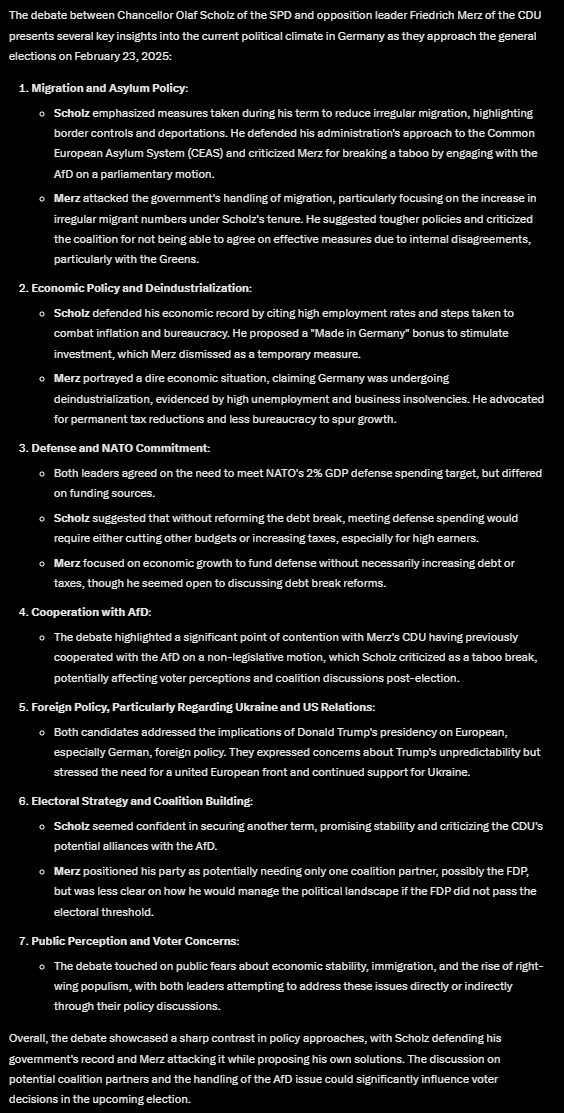
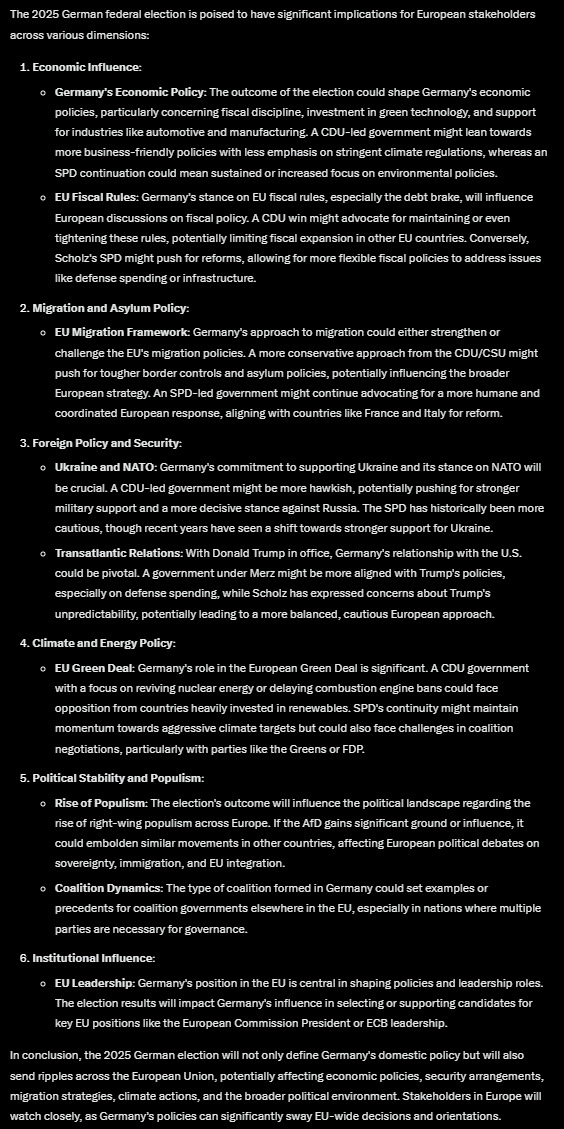
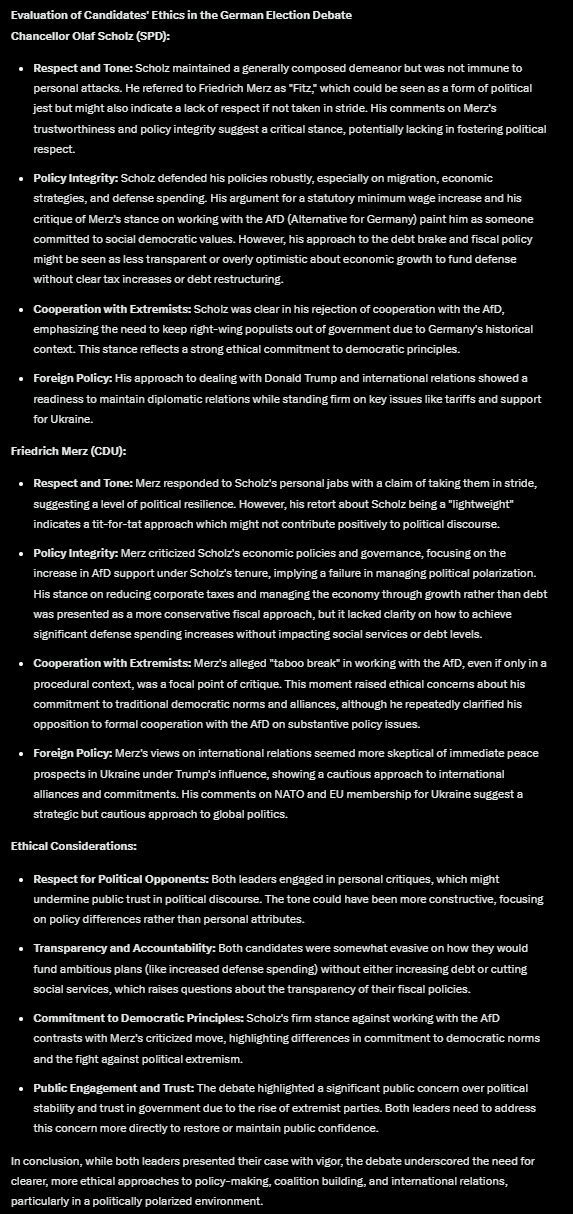
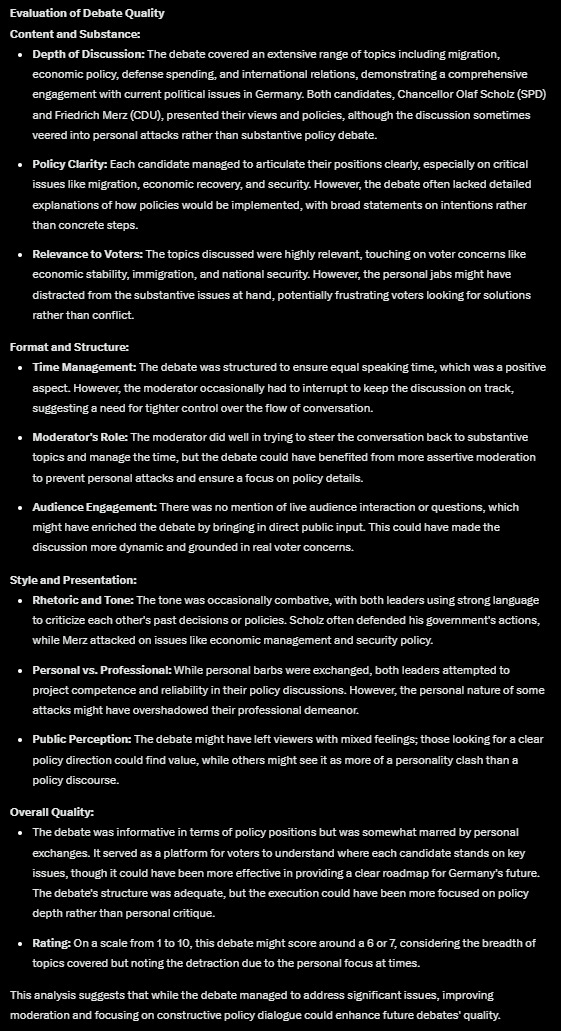
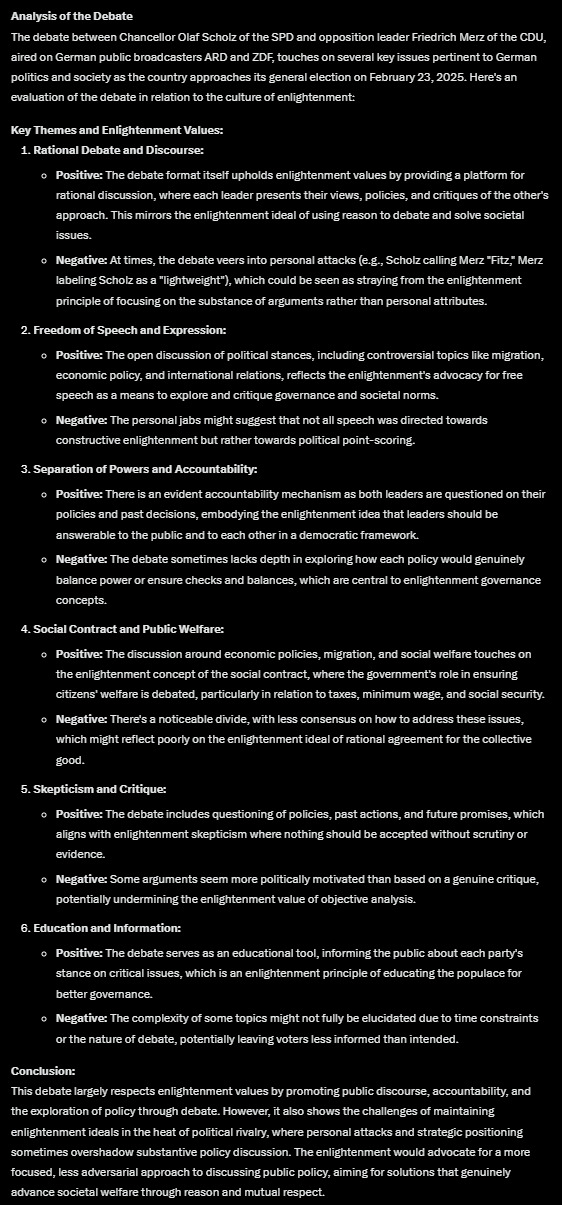
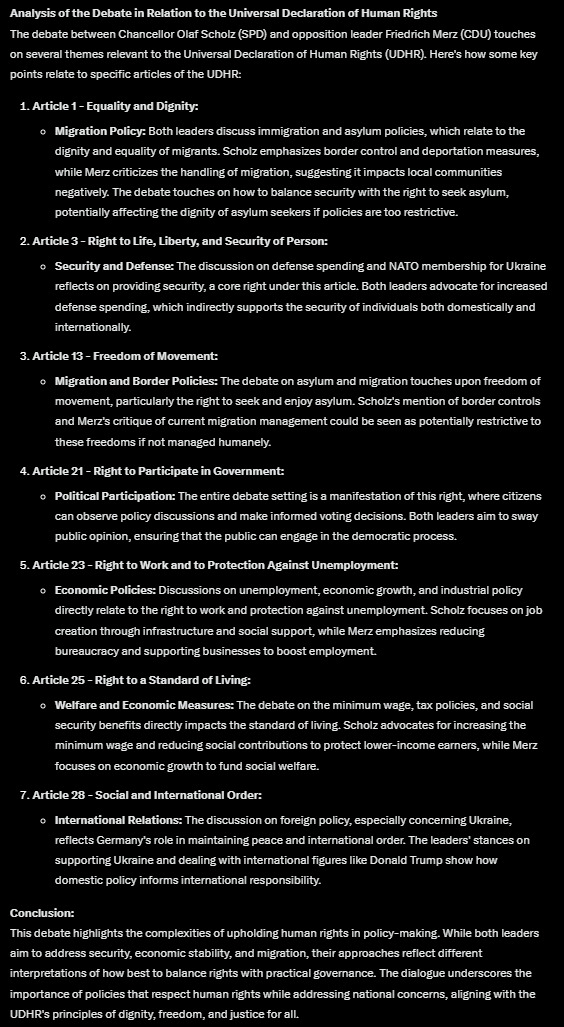
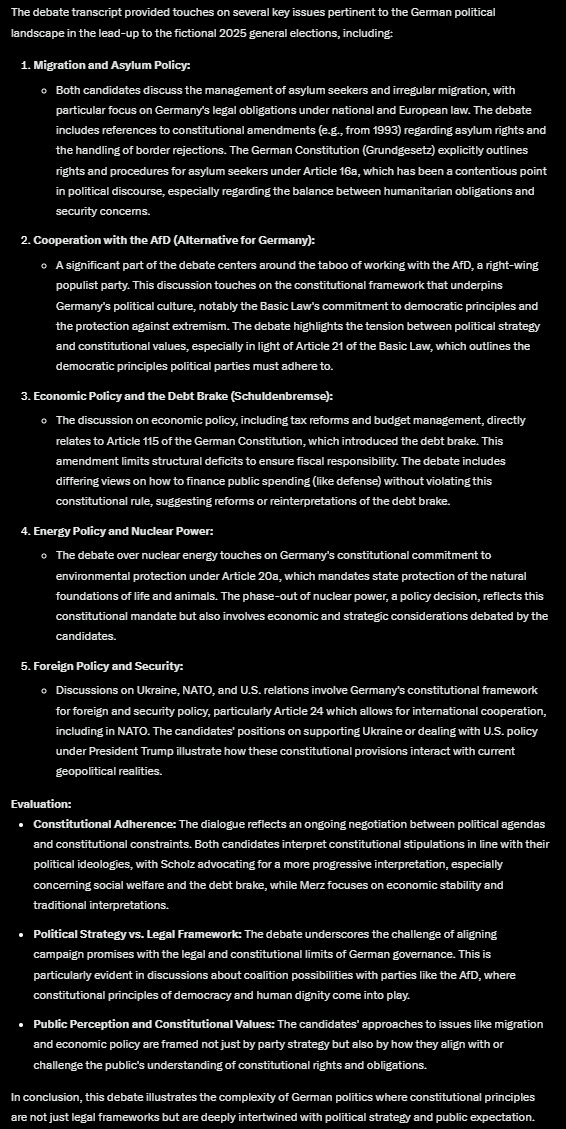
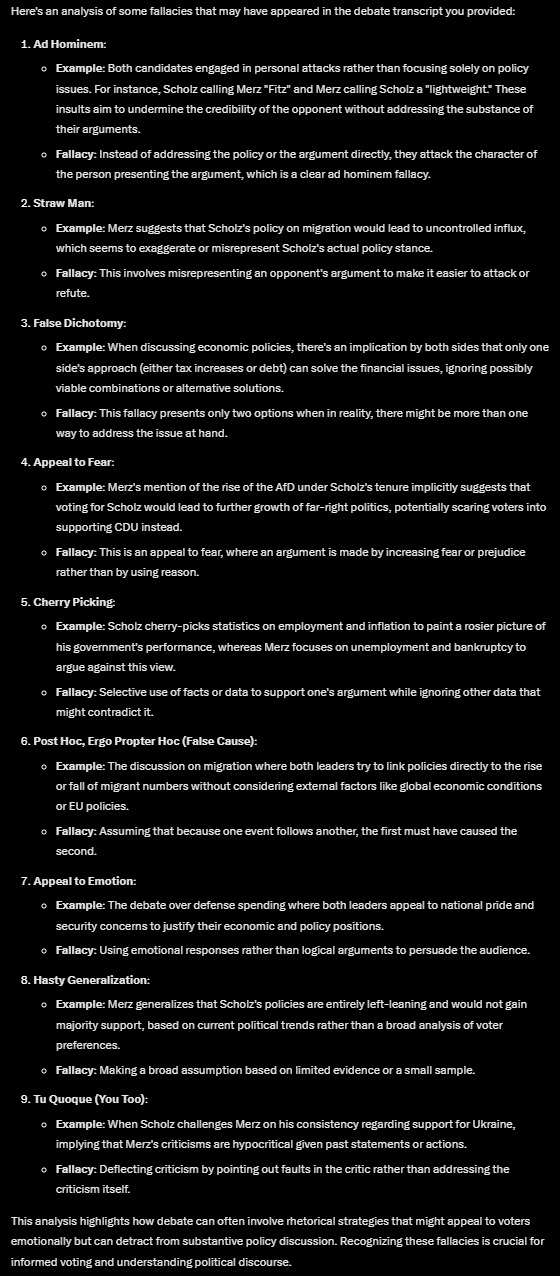
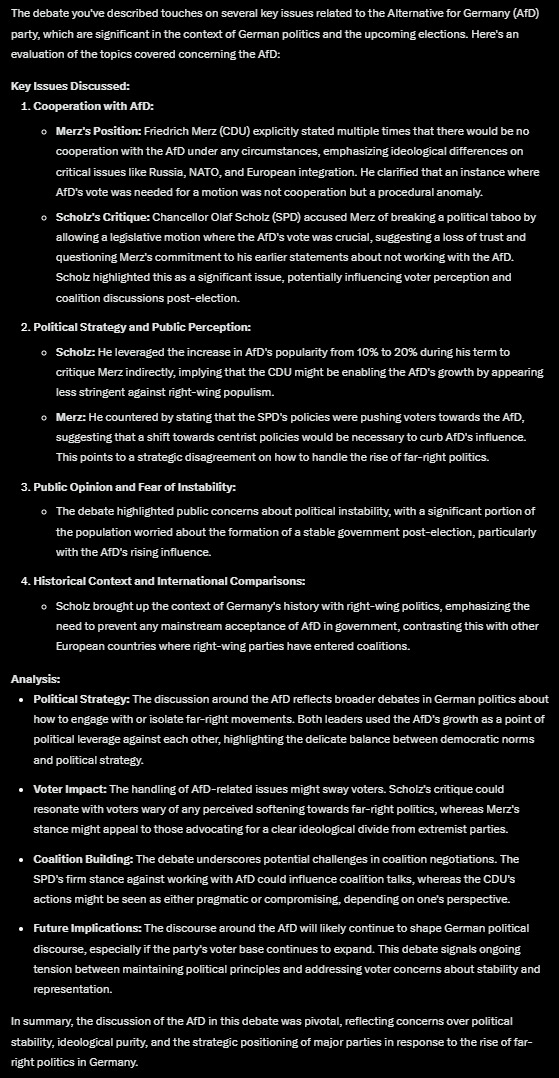
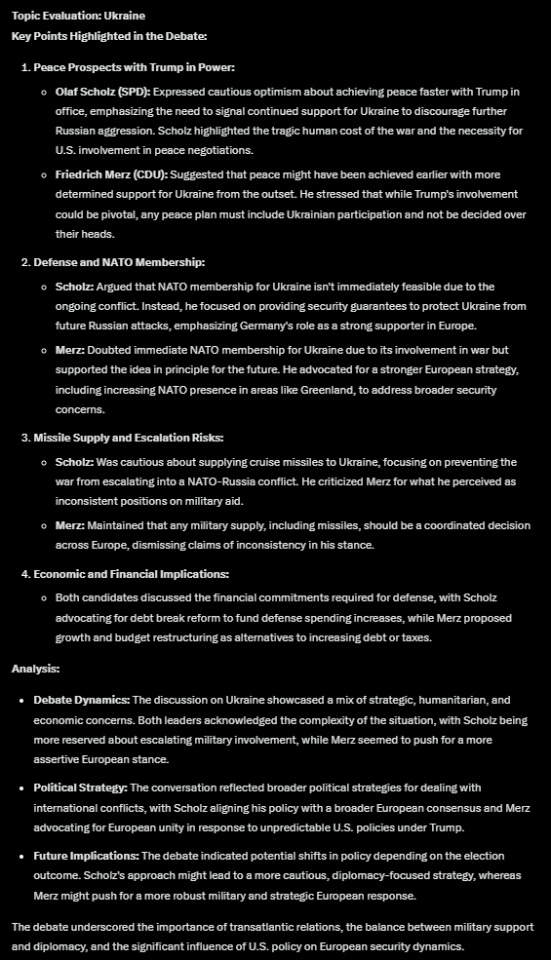
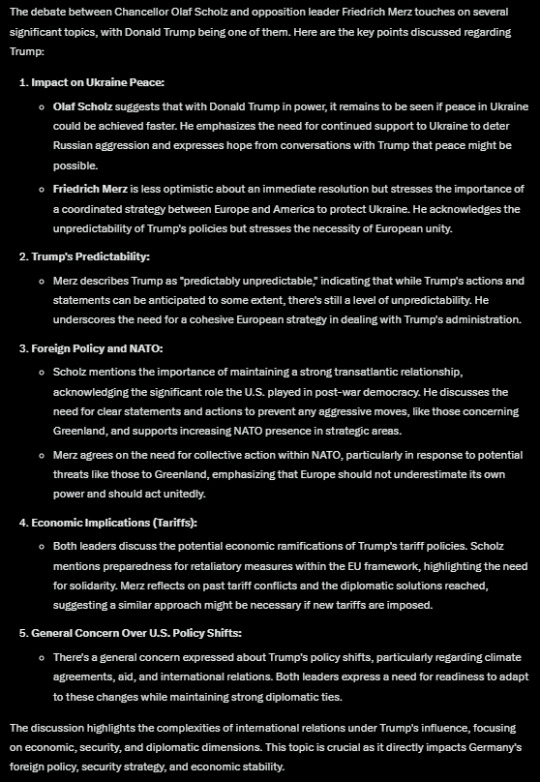
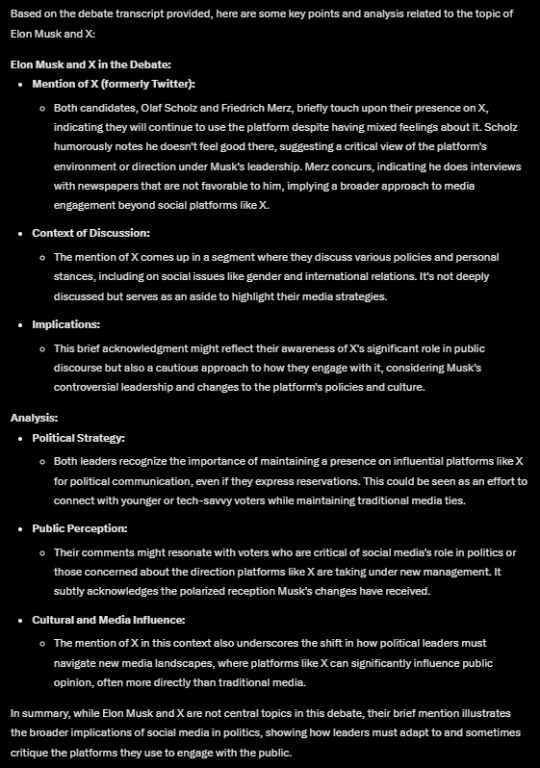
#GermanElections2025#ScholzMerzDebate#SPDvsCDU#GermanPolitics#MigrationPolicy#EconomicCrisis#GermanyEconomy#EnergyPolicy#NuclearPhaseOut#RenewableEnergy#TaxReform#SocialSecurity#DefenseSpending#NATO#UkraineWar#TrumpPolicies#ClimateChange#BureaucracyReduction#MinimumWage#CoalitionTalks#AFD#GermanCoalition#PoliticalDebate#PublicDebate#Voting2025#Election2025#GermanVoters#PolicyChange#GovernmentStability#Youtube
0 notes
Text
Claudia Sheinbaum Makes History: Mexico’s First Female President-Elect Sets a Bold New Vision

Claudia Sheinbaum Pardo has recently gained attention as she becomes Mexico's first female president-elect, marking a historic moment in the country's political landscape. Her victory is seen as breaking a longstanding gender barrier, as she is set to take office after 65 male predecessors in the position. This accomplishment is not only significant for Mexico but also globally, as she brings a new vision rooted in her scientific background and her tenure as the former mayor of Mexico City.
A Political and Scientific Leader
Sheinbaum's rise to the presidency is notable due to her background as an environmental scientist and her expertise in climate policy. Her administration is expected to focus on continuing and accelerating Mexico’s energy transition, balancing traditional energy sources with the development of renewable energy projects. She plans to strengthen state-owned enterprises like Pemex and the Federal Electricity Commission (CFE) while promoting renewable energy initiatives such as solar power and electromobility in major cities.
Challenges and Policy Directions
Sheinbaum’s presidency is expected to face numerous challenges, particularly in the areas of migration, judicial reform, and energy policy. On the migration front, she has indicated a commitment to addressing root causes and has expressed intentions to collaborate with international organizations like the United Nations. However, there is skepticism about whether her administration will depart from current policies, which have focused heavily on militarized immigration containment.
In energy, Sheinbaum aims to push for cleaner sources of power and reduce the country's dependence on hydrocarbons. Yet, achieving this ambitious energy transition will require substantial investment, technological advancements, and efficient use of private capital.
Cultural and Political Dynamics
Sheinbaum's candidacy has also been subject to controversies related to her identity, as she faced attacks questioning her Mexican heritage due to her Jewish background. Despite these issues, experts believe that her religious or ethnic identity will not play a significant role in her governance or electoral outcomes【21†source】. Her platform, although left-leaning, is not considered radically different from the current administration, which might appeal to broader sections of the electorate.
Future Outlook
With her historic victory, Sheinbaum is expected to bring a fresh perspective to Mexico's presidency, but she faces the dual challenge of maintaining political stability while pushing forward with reforms. As her administration takes shape, it will be closely watched for its approach to critical issues like energy policy, migration, and judicial reform, which will define her legacy in Mexico and on the international stage.
#ClaudiaSheinbaum#MexicoPolitics#FirstFemalePresident#SheinbaumPresidency#Mexico2024#PoliticalHistory#EnergyTransition#MigrationPolicy#LatinAmericaLeadership#BreakingBarriers
0 notes
Photo

Calling all aspiring migrants! In this blog post, we delve into the exciting details unveiled in the YouTube video "Unveiling Australia's Migration Blueprint for 2024: A Guide for Aspiring Migrants."... https://bit.ly/4cj8Ou6/
#JobsTips#migration#aspiringmigrants#Australia#Australianmigration#FamilyMigration#migrationblueprint#migrationlaw#migrationpolicy#refugeemigration#skilledmigration#studentmigration
0 notes
Text

Under Hungary's new immigration law, skilled workers, low-skilled workers, and investors are now in separate categories among the 24 available residence permits, including 8 for employment. This law is stricter, suspending new applications until April 30, 2024. Worker residency is granted for 3 years, non-extendable, based on previous employment evaluation. A "Golden Visa" offers permanent residency for 10 years with a €250,000 investment, extendable for another decade.
#HungaryImmigration#NewVisaLaw#24VisaPermits#ImmigrationUpdate#LegalMigration#VisaPolicy#GoldenVisa#SkilledWorkers#Investors#ResidencyPermits#MigrationLaw#WorkerResidency#ImmigrationReform#VisaRegulations#HungaryLaw#VisaOptions#MigrationPolicy#VisaPermits#EmploymentVisas#ImmigrationNews#VisaSystem#LegalVisas#PermanentResidency#ExtendableVisas#EuropeanImmigration
0 notes
Video
youtube
Australia's Migration Boom | Australia's Net Migration Hits 445,510
🔴 To know more: https://imminews.com.au/australias-net-migration-hits-445510-australias-migration-boom
🔴 Australia's Latest Immigration Updates: https://imminews.com.au/
🔴 Canada's Latest Immigration Updates: https://imminews.ca/
🔴 Join our WhatsApp Group Now:: http://www.a2zimmi.com/wapinfo ___________________________________
Do you know Australia has made it easier for skilled migrants with temporary visas to change jobs and sponsors by relaxing work permit criteria? Temporary Work Visa holders can now explore diverse job opportunities within an extended period.
___________________________________
Book a Consultation Session: https://api.whatsapp.com/send/?phone=919877456409&text=%20Hi%20I%20have%20recently%20watched%20your%20video_Australia%20Eases%20Migration%20Pathway%20for%20Skilled%20Migrants,%20and%20I%20have%20an%20Immigration%20related%20query%20for%20my%20profile.%20My%20Query%20is
___________________________________
Contact us at Whatsapp: +1 (587) 837-9606 | +91-6283962009 ___________________________________
0 notes
Text
US and Mexico Work Together to Improve Relations and Address Migration Challenges #migrationpolicies #USMexicorelations
0 notes
Text
Can Migration Policies Unlock Global Prosperity?
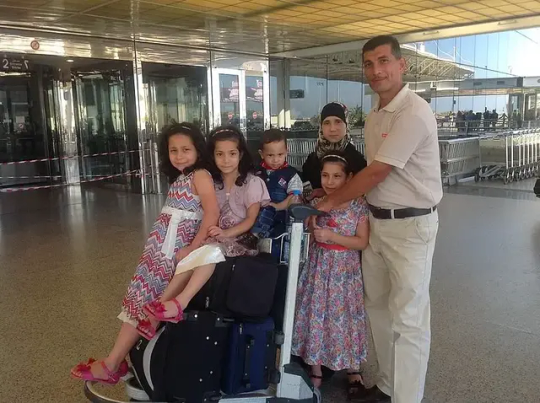
Populations across the globe are aging at an unprecedented pace, making many countries increasingly reliant on migration to realize their long-term growth potential, according to a new report from the World Bank. The World Development Report 2023: Migrants, Refugees, and Societies, identifies this trend as a unique opportunity to make migration work better for economies and people. Wealthy countries as well as a growing number of middle-income countries—traditionally among the main sources of migrants—face diminishing populations, intensifying the global competition for workers and talent. Meanwhile, most low-income countries are expected to see rapid population growth, putting them under pressure to create more jobs for young people. “Migration can be a powerful force for prosperity and development,” said World Bank Senior Managing Director Axel van Trotsenburg. “When it is managed properly, it provides benefits for all people — in origin and destination societies.” In the coming decades, the share of working-age adults will drop sharply in many countries. Spain, with a population of 47 million, is projected to shrink by more than one third by 2100, with those above age 65 increasing from 20% to 39% of the population. Countries like Mexico, Thailand, Tunisia and Türkiye may soon need more foreign workers because their population is no longer growing. Beyond this demographic shift, the forces driving migration are also changing, making cross-border movements more diverse and complex. Today, destination and origin countries span all income levels, with many countries such as Mexico, Nigeria, and the U.K. both sending and receiving migrants. The number of refugees nearly tripled over the last decade. Climate change threatens to fuel more migration. So far, most climate-driven movements were within countries, but about 40% of the world’s population—3.5 billion people—lives in places highly exposed to climate impacts. Current approaches not only fail to maximize the potential development gains of migration, they also cause great suffering for people moving in distress. About 2.5% of the world’s population—184 million people, including 37 million refugees—now live outside their country of nationality. The largest share—43%—lives in developing countries. The report underscores the urgency of managing migration better. The goal of policymakers should be to strengthen the match of migrants’ skills with the demand in destination societies, while protecting refugees and reducing the need for distressed movements. The report provides a framework for policymakers on how to do this. “This World Development Report proposes a simple but powerful framework to aid the making of migration and refugee policy,” said Indermit Gill, Chief Economist of the World Bank Group and Senior Vice President for Development Economics. “It tells us when such policies can be made unilaterally by destination countries, when they are better made plurilaterally by destination, transit and origin countries, and when they must be considered a multilateral responsibility.” Origin countries should make labor migration an explicit part of their development strategy. They should lower remittance costs, facilitate knowledge transfers from their diaspora, build skills that are in high demand globally so that citizens can get better jobs if they migrate, mitigate the adverse effects of “brain drain,” protect their nationals while abroad, and support them upon return. Destination countries should encourage migration where the skills migrants bring are in high demand, facilitate their inclusion, and address social impacts that raise concerns among their citizens. They should let refugees move, get jobs, and access national services wherever they are available. International cooperation is essential to make migration a strong force for development. Bilateral cooperation can strengthen the match of migrants’ skills with the needs of destination societies. Multilateral efforts are needed to share the costs of refugee-hosting and to address distressed migration. Voices that are underrepresented in the migration debate must be heard: this includes developing countries, the private sector and other stakeholders, and migrants and refugees themselves. Sources: THX News & World Bank. Read the full article
0 notes
Photo

19659001 #JTRAVELS #UKimmigration #UKvisas #ukrwandabill #immigrationlawUK #migrantrightsUK #Britishcitizenship #immigrationpolicyUK #asylumseekersUK #UKbordercontrol #immigrationreformUK #immigrationconsultantsUK. #UKimmigration #immigration #ukborder #visa #brexit #migrant #refugee #immigrant #asylum #bordercontrol 19459006 #citizenship #migration #ukgovernment 19459006 #workpermit #integration 19459006 #homeoffice #uklaw #immigrationpolicy #europeanunion 19459006 #ukvisas #crossingborders #uklawyers #ukparliament #migrationpolicy #immigrantcommunity 19459006 #ukborderforce 19459006 #immigrationreform 19459006 #foreignworkers 19459006 #immigrationsystem 19459006 #refugeecrisis 19459006 #ukworkforce 19459006…
0 notes
Photo

#JTRAVELS #UKimmigration #UKvisas #ukrwandabill #immigrationlawUK #migrantrightsUK #Britishcitizenship #immigrationpolicyUK #asylumseekersUK #UKbordercontrol #immigrationreformUK #immigrationconsultantsUK. #UKimmigration #immigration #ukborder #visa #brexit #migrant #refugee #immigrant #asylum #bordercontrol 19459006 #citizenship #migration #ukgovernment 19459006 #workpermit #integration 19459006 #homeoffice #uklaw #immigrationpolicy 19459006 #europeanunion #ukvisas #crossingborders #uklawyers #ukparliament #migrationpolicy #immigrantcommunity 19459006 #ukborderforce #immigrationreform 19459006 #foreignworkers #immigrationsystem 19459006 #refugeecrisis #ukworkforce #bordersecurity 19459006 #entrypermit 19459006 #immigrationlaw…
0 notes
Text
🌍 Bold EU Plans 2025: Shaping Europe’s Future
The European Union is at a pivotal moment as it navigates complex challenges and opportunities leading into 2025. In this insightful video, António Costa, Ursula von der Leyen, and Viktor Orbán discuss key strategies for Europe’s future:
youtube
🔹 Ukraine: Continued support for sovereignty and peace 🔹 Migration: Addressing illegal migration while preserving the Schengen Zone 🔹 Economic Competitiveness: Bold reforms through the Budapest Declaration 🔹 Syria: Rebuilding with renewed humanitarian aid
What to Expect:
Full speeches from the EU’s top leaders
Analysis of Europe’s strategies to remain competitive globally
Key insights into EU-U.S. partnerships and global relations
📢 Join the Conversation:
How do you see Europe evolving by 2025?
Can the EU maintain unity and overcome these pressing challenges?
👉 Watch the full video here: https://youtu.be/ybjlgVmgcok
#euplans2025#migrationpolicy#ukraineaid#syriapeace#europeanunion#globalcompetitiveness#schengenzone#ursulavonderleyen#antoniocosta#viktororban#europe2025#Youtube
0 notes
Text

Rudraksh Immigration Group keeps itself updated with the latest policies of popular migration destinations.
If you would like to benefit from any of these, make sure to contact us today!
#MigrationExperts #rudrakshgroupmohali #immigration #rudrakshimmigrationmohali #MigrationPolicies
0 notes
Text
How welcoming is Australia with its post-pandemic migration policies?
As the world grapples with service and labor shortages in the aftermath of the Covid-19 pandemic, people movement - also known as migration - is being affected massively. While governments of various nations had been under extreme pressure to curb immigrants' influx, unlike other countries, Australia has still not relaxed its migration policies, thereby still abiding by the same rule of restricting migrant entry into the country.
The flow of migrants is quite critical to economies. And as it has been put on a limitation, Australia has been experiencing a significant downfall. As a country that was once a favorite destination for migrants and always lent a helping and welcoming hand to the new arrivals - it is no longer seen as an easy country to move to, barring the current migration policies of the government - inflexible and unrelaxed.
These policies have resulted in various problems, including labor shortage and the education system experiencing a decline as overseas student admissions have not been registered. There's an increase in entry-level positions but barely enough people to take those roles - hence a surge in the standard pay rates for the minimum number of citizens willing to work in these sectors.
The epidemic crisis has left the country with long-lasting repercussions given the current migration policies and how Australia has always depended on temporary migration for industry and economic growth. Australia must consider a relaxed approach towards these policies and make them flexible for new arrivals. The refusal rate is too high at the moment, which has been holding the government back from being welcoming to migration seekers.
As an experienced migration advisor, I feel the only solution to this problem is the revision of the migration policies- enabling the rules to go easy on migrants holding and seeking temporary visas. Since this problem is affecting businesses and the education sector the most, allowing a proper flow of temporary migrants into the country can help these industries to go back up and flourish as they used to.
In my opinion, Australia should restart the flow of international students into the country to save the education system from being left to wither on the vine. International education has been Australia's second-largest service export, contributing about $38 billion to the country's economy and supporting 250,000 jobs each year.
Even if there are a few policies allowing entry of migrants, they are extremely strict at the department level, resulting in the rejection of the average and below-average applications.
I think Australia should relax its migration policies as the revision will help curb the following problems:
● Struggling businesses that have not been able to flourish due to labor shortages will be able to get back into the industry competition easily.
● The high demand and low supply chain will halt, enabling businesses to hire people at the standard pay rates without worrying about paying extra to the limited workers they get to keep.
● Current empty institutions will be able to fill up to their best capacities. ● Australia will again be seen on the world map as a favorite destination for migrants, especially young students looking to study and permanent visa seekers.
In my view, easing migration policies will help curb the labor shortage problem. What, according to you, will help improve the lingering conditions and what is the solution to help labor shortage and deteriorating education industry?
0 notes
Quote
Favorite tweets: .@MPI_Europe is hiring an Associate Policy Analyst to join its team in Brussels! This position is perfect for someone eager to gain migration research experience at a leading international think tank. Info on how to apply: https://t.co/hQhwR0GU4D pic.twitter.com/EwWDb9FSDc— MigrationPolicy Inst (@MigrationPolicy) December 26, 2020
http://twitter.com/MigrationPolicy
0 notes
Photo
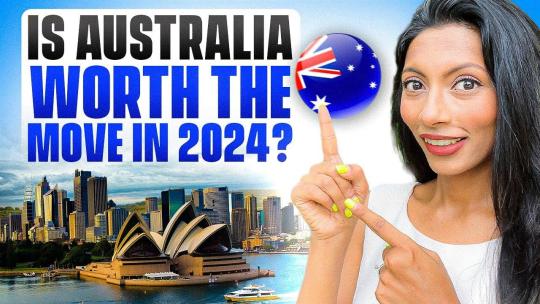
Embark on the Migration Odyssey: Unraveling Australia's 2024 Migration Reset Calling all dreamers, adventurers, and those seeking a new chapter in a vibrant land! Join us as we unveil the path to Dow... https://bit.ly/4cj8Ou6/
#JobsTips#migration#2024#Australia#AustralianEconomy#AustralianGovernment#DownUnder#Immigration#ImmigrationLaw#MigrationPathways#migrationpolicy#MigrationRevolution#permanentresidency#SkilledVisas#StudyinAustralia#visa#WorkinAustralia
0 notes